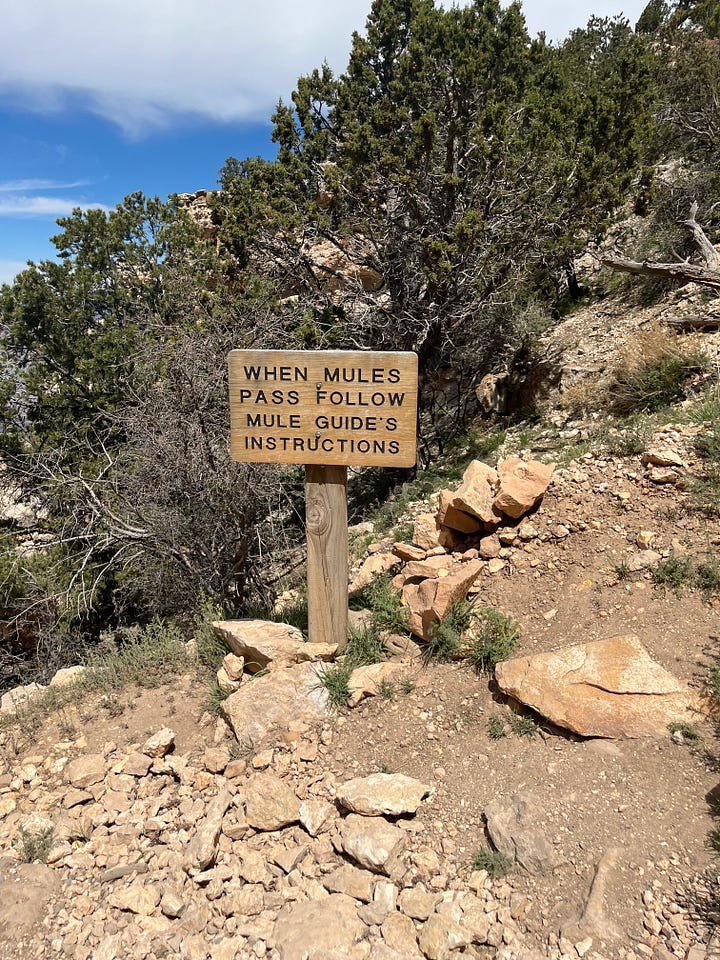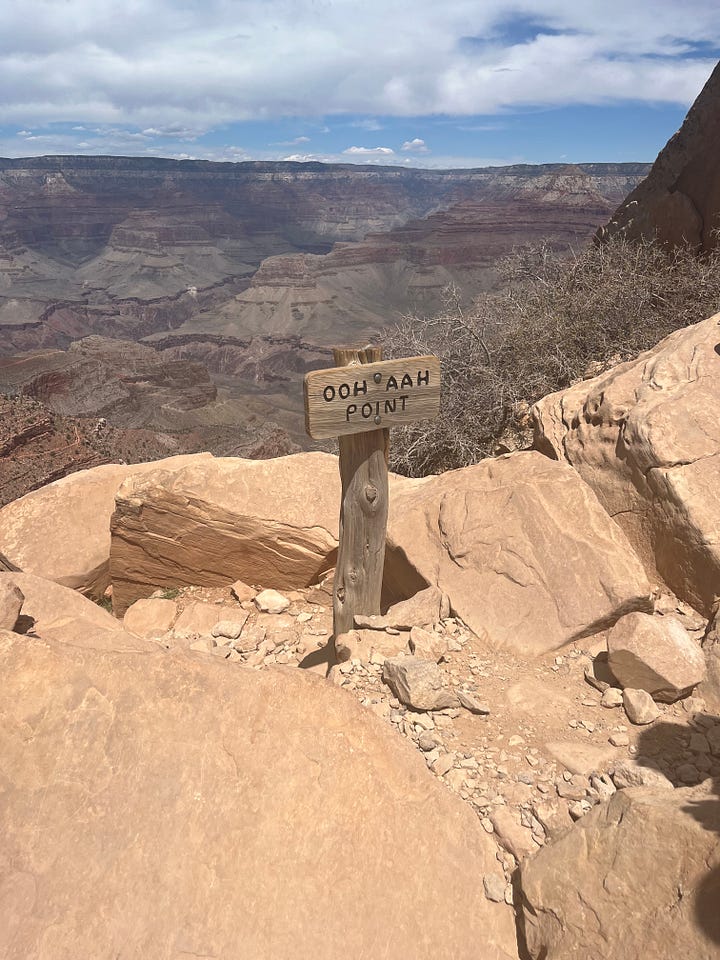When I said I wasn’t going to teach any yoga classes in April because it was a bananas month, I understood “bananas” to mean the sheer number of things that were happening: my husband’s first triathlon, friends in town because of that, a solar eclipse, a yoga retreat at the Grand Canyon, finishing a 15-month administrative training program, plus the usuals of STAAR testing, end-of-year field trips, and summer travel planning.
What “bananas” actually meant was an emotional roller coaster that I should have seen coming but didn’t. There was so much good, and so much not-so-good. I had both the best and worst day teaching I’ve had all year in April. I finished both long- and short-term projects, sat in more interviews and made a bunch of big decisions, and felt deeply ambivalent about other decisions I should have made. Because of the number of things that were culminating (and the number of people who contributed to those things), I have been thinking a lot about words. I’ve been thinking a lot about a lot, actually, but working through all of that to the point where I feel like I can share it cohesively and authentically will take time.
Words, though, I can always talk about.
The biggest revelation in my training program was the fact that one of my defining characteristics that I have always thought was a problem is actually an asset. I’m a verbal processor; I have no idea what I think until I say it out loud, and have no clue how to solve a problem until I say all the bad ideas to a person to get to the good ones. I’m a reader, I’m a Gemini, I’m a big-picture dreamer trapped in a detail-oriented thinker’s mind. I’ve been this way since I was tiny, and it’s been a source of annoyance for a huge number of people, and a torment to me, because I have tried everything I know to change it (counting the number of times I talk, limiting the amount of time I talk for, planning out what I say ahead of time, “three before me,” asking one question for every statement I make, etc. etc. etc.) and just. nothing. works.
It’s not all agony, though, because I prize good talking above almost all else in my relationships. I am disappointed by phone conversations that last less than an hour, and I’d almost always rather sit in a coffee shop and talk than go “do” something. Occasionally, I meet people who have the patience to sit with me while I think out loud. Even less often, I’ll find someone who does conversation in the same way that I do, where the ideas and the banter and the words sparkle in a way that I (ironically) can’t quite explain, but that my heart and my body recognize. Aminatou Sow and Ann Friedman call this sensation, “I love your brain,” or, “You’re smart, you’re clever, I want to hear what you think about everything.” Usually, this happens for me at work, because I spend so much energy there, and my favorite exchanges often offer the bridge between only talking about work to starting to talk broader, more expansively.
And I’ve been graced with a lot of that in the past year and, more specifically, the past month. I’ve also needed to draw on my words in the past two weeks, digging deep to tell people how they’ve impacted my journey. For the culmination of my training program, our leaders asked us to make 30-second videos for our cohort-members, which I grumbled about until I sat down to actually do it and got fully caught up in the scope of what we had accomplished together. I felt compelled to tell a story to one of the yoga retreat leaders that I was sure she was unaware of but which had reshaped my inner landscape (more on that later). I was finally able to make space to formally thank my administrative project team for all of the extra work, time, energy, and love they gave to make sure I could complete my certification. I’ve written probably 25 drafts of this combination of pieces, all by hand, with lots of x’s and arrows and circles and “WTF’s” in the margins. Capturing heart-expanding ideas in words is no easy task, and doing it to fit within the space of a card or the hour between a yoga workshop and dinner is a whole other level of “creative constraint.”


What I kept thinking through this whole process was the phrase “too many and never enough.” I will never be concise - I promised that I wouldn’t happen at the beginning of this Substack project, and I’ve never been wrong. I believe deeply that if I just keep talking - or writing - I’ll find the right words to express the depth that I feel. Of course, I know from experience that some feelings are deep enough that there are simply not enough words to get there. Both things can be true at the same time, and I’ve never worked out precisely the balance. Somehow, accepting that there may BE no appropriate balance has helped. And, as with most things, naming it helps: for two of these significant expressions of gratitude, I just straight up said it: this will be too long, and it won’t fully say the thing that I mean, but this is my best effort.
It’s funny, actually, because I’ve had many conversations about words with these two people. One of the members of my project team (my whole TEAM is exceptional at this talking dynamic, though this example stands out because we’ve talked about it straight-out) is a leader I respect with a depth I know better than to try capture in words. She’s also a verbal processor, and is one of the people who said to me, multiple times this year, that talking things out with people is good leadership, is a valuable skill, is a way to make sure you don’t get stuck in your head, only using your own resources rather than those of the collective. I’m still working to believe this, but had a profound response to hearing it, even if I don’t trust it fully yet. I love this person’s brain, and the amount of learning I’ve been able to do by talking to her and listening to her talk has been truly stunning.
My yoga teacher has helped me work through the way my brain tends to over-fixate on words in intention-setting or accessing my sankalpa. This year, she’s (gently) pushed me to set intentions that are feelings or sensations rather than spending all of my energy in savasana looking for the right words, and it’s fundamentally changed my practice.
What I have also found to be true, in these two weeks, in the past two decades, in some kind of time-warped reality that only my body understands, is that sometimes, when I’ve exhausted the resources that words have to offer, I have more access to the sensations like she is asking me to make room for, and, in turn, those sensations give way to the single words that I was looking for in the first place. Expand. Growth. Trust. Gratitude. Surrender. Grace.
And when I’m in the presence of those words, it gets easier to leave it all on the page (the card, the email, the Zoom chat) and whisper, with my hands stacked over my heart, “thank you, thank you, thank you” to my people and to the universe and trust it will be heard, and felt, exactly as it’s meant.
What conversations have re-shaped how you see the world?
How do you define “conversational sparkle”? What has to happen for that spark? (Or, if you’re not an obsessive word person, what brings that feeling of connection for you?)
What words are you reading, listening to, or thinking about this month?
I’m excited to be teaching again! I’m trying out a different schedule for Sundays, with one morning class and one evening class. There’s also a question on the RSVP form about scheduling. I’ll likely be re-thinking the schedule next school year, so would love to experiment with what will work for the most people over the summer when I have a little more flexibility.







